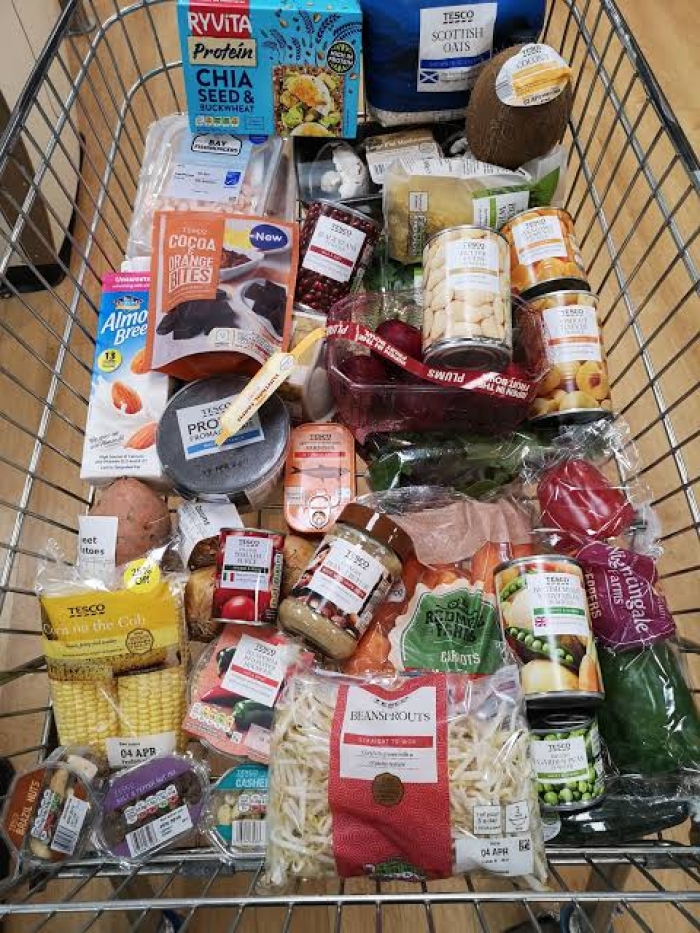Tesco London prices as at Sunday August 18:
25kg of white rice - £37.50
25kg of brown beans - £60
400g of white bread - £1.20
1 crate of 6 eggs - £1.20
1kg of broiler chicken - £4.00.
For a family of 4 living on the monthly minimum wage of £1,830.40 in London earned by one of two adults in the family, let’s assume the following monthly food consumption:
1). 25kg of white rice - £37.50
2). 25kg of brown beans - £60
3). 30 loaves of 400g of white bread @ £1.20 per loaf = £36
4). 10 crates of eggs in units of 6 eggs = £1.20 x 10 = £12
5). 20kg of broiler chicken @ £4.00 per kg = £80
Total = £225.50
This is 12.32 percent of total monthly pay of £1,830.40.
Abuja prices as at Sunday August 18:
25kg of white rice - N40,000
25kg of brown beans - N75,000
400g of white bread - N1,500
1 crate of 6 eggs - N1,000
1kg of broiler chicken - N3,500.
For a family of 4 living on the newly approved monthly minimum wage of N70,000 in Abuja earned by one of two adults in the family, let’s assume precisely the same monthly food consumption as their counterpart in London:
1). 25kg of white rice - N40,000
2). 25kg of brown beans - N75,000
3). 30 loaves of 400g of white bread @ N1,500 per loaf = N45,000
4). 10 crates of eggs in units of 6 eggs = N1,000 x 10 = N10,000
5). 20kg of broiler chicken @ N3,500 per kg = N70,000
Total = N240,000
This is 343 percent of total monthly pay of N70,000.
This data paints a stark picture of the economic challenges faced by wage earners in Nigeria compared to their counterparts in the UK. Let's analyze the implications:
1. Purchasing Power Disparity:
The most glaring observation is the vast difference in purchasing power. While a minimum wage earner in London spends only 12.32% of their monthly income on this basic food basket, a minimum wage earner in Abuja would need to spend 343% of their monthly income to afford the same items. This means the Nigerian worker cannot even afford this basic food basket with their entire monthly salary, let alone cover other essential expenses like housing, transportation, healthcare, and education.
2. Food Insecurity:
The data suggests severe food insecurity for wage earners in Nigeria. If basic staples cost more than three times the monthly minimum wage, it's clear that many families are likely facing malnutrition or hunger, forced to drastically reduce their food intake or quality.
3. Poverty Trap:
This situation illustrates a poverty trap for Nigerian workers. With such a high proportion of income required just for basic nutrition, there's virtually no opportunity for savings, investment in education, or any form of economic advancement.
4. Quality of Life:
The extreme disparity in purchasing power translates directly to a significantly lower quality of life for Nigerian workers. While their London counterparts can afford food with a substantial portion of their income left for other needs, Nigerian workers are struggling for mere survival.
5. Economic Stress and Social Implications:
The financial stress of being unable to afford basic necessities can lead to numerous social problems, including increased crime rates, health issues due to malnutrition, lower educational attainment, and social unrest. The recent #EndBadGovernment protests were a confirmation of this.
6. Inflation and Currency Devaluation:
The high food prices in Nigeria relative to wages also reflect issues of inflation and currency devaluation. This further erodes the purchasing power of Nigerian workers over time.
7. Income Inequality:
This comparison highlights extreme income inequality, not just between countries but within Nigeria as well. If minimum wage earners cannot afford basic necessities, it suggests a wide gap between the lowest earners and those at the top of the economic ladder.
8. Challenge to Economic Growth:
When a significant portion of the population is trapped in such extreme poverty, it presents a major obstacle to overall economic growth and development for the country.
9. Inadequacy of Minimum Wage:
The data clearly shows that the newly approved minimum wage in Nigeria is grossly inadequate to meet even the most basic needs of workers and their families.
In conclusion, this comparison starkly refutes any narrative suggesting that Nigerian workers are getting more value for their pay. Instead, it highlights the extreme hardship and poverty faced by ordinary Nigerians, particularly those earning minimum wage. The data underscores the urgent need for significant economic reforms and social support measures to address the dire situation faced by many Nigerian families.

































































